Alumni
Our graduates successfully pursue careers in companies such as Google, Facebook, IBM, Oracle and Avast, and universities such as Stanford, MIT, Cambridge and Warwick. Whilst we of course cannot claim that their success is solely due to us – much owes to personal diligence and creativity – it may be of interest to read what some of our graduates have said about their studies at “Matfyz” (in Czech the Mathematics and Physics Faculty is called “Matfyz” for short).
Aakash Ravi (COO, Spaceti)
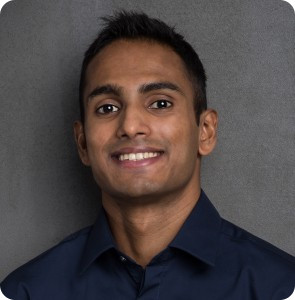
The most important thing that a university can teach you, especially at the Bachelor’s level, is how to think. Matfyz did just that, forcing me to abandon my old ways of unstructured thinking and adopt a logical, analytical, and a process-based reasoning ability by forcing me to learn the essentials of mathematical reasoning at a very early stage. Thanks to my bachelor’s education at Matfyz, I was able to easily thrive in demanding corporate engineering environments like IBM, challenging higher level institutions such as Stanford, and also start a technology company while still in college.
My company Spaceti is one of the most successful early stage companies from the CEE region, and (at the time of writing, in early 2018) we are working with active clients in over 10 countries and raised a large investment round with Reflex Capital and FastForward after just 1 year of operation. As COO of the company, I am focused on a lot more than programming and algorithms. My firm grounding in mathematics and computer science, however, help me to make product and business decisions in a much more logical way with an analytical mindset and minimize the number of errors.
Moreover, many of my brilliant colleagues are also Matfyz students, working tirelessly to make Spaceti a global technology leader in the smart buildings industry. They inspire me every day and remind me why Matfyz is such an amazing place to study and innovate.
Václav Novák (Senior Software Engineer, Google Research)
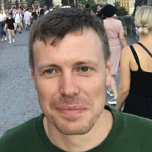
What do you want to do when you grow up? I have been struggling with this question for a long time and I still don't know the answer, but I consider myself lucky for choosing Matfyz computer science program as my haven while I was figuring out what to do next. At first I was surprised there was very little about computers in the curriculum, but then it turned out it was far more interesting: We learned about the problems computer can solve and about theories which can translate everyday problems into well defined mathematical concepts and structures. Today these firm foundations still are my ticket to the best jobs in the industry, while the actual computers and user interfaces of the time are largely forgotten.
Another surprise came from the culture of good humor, respect and dialog, which captivated me right from the beginning. This feeling only grew over time, even when I turned to computational linguistics where the discussions sometimes questioned our deeply held intuitions about how human languages actually work. This made my studies enjoyable, but looking back asking what really gave me the edge and allowed me to work alongside world's best natural language processing practitioners on products like Amazon Alexa and Google Pixel Personal AI, it was our Matfyz department ambition to partner with top institutions worldwide and to leverage the rich Czech linguistic tradition to be a worthy partner to them.
Markéta Tomková (Leadership Fellow at Ludwig Cancer Research, University of Oxford)
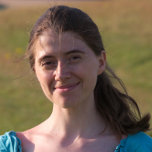
The first memory that comes to my mind when thinking about my studies at Matfyz is the friendly, relaxed, and cooperative (rather than competitive) atmosphere. I fondly remember the enthusiastic discussions with fellow students and professors, who were happy to spend their free time after lectures and seminars discussing our curious questions. I believe that this atmosphere promoted interest in the different subjects and motivated us to spend endless days and nights programming, finding proofs and solving problems in a much better way than any strict rules could do.
Matfyz is excellent at preparing students for a broad range of professions, being well known for teaching how to think analytically and critically and how to solve new problems, in addition to giving a solid foundation in mathematics and computer science. Now I work in cancer research and even though I spend much more time thinking about biology than developing any complicated algorithms, Matfyz gave me an excellent foundation for my interdisciplinary research. I use skills and knowledge from a wide range of subjects, spanning from the practical courses of programming, through usage of mathematics and algorithms in development of novel bioinformatics methods, to all the indirect benefits of theoretical subjects. These include the way of thinking, logic, inference, but also for instance attention to details practiced during dealing with corner cases in proofs of theorems.
Having experience from the University of Oxford also as a student, I find the education at Matfyz to be truly excellent, comparable to the world's top universities. Next to the outstanding quality of teaching at Matfyz, I highly valued the opportunity to get experience with research already during the bachelor and master studies. At the same time, the time I invested in research could be also invested into practical skills such as software engineering, or more theoretical studies, highlighting how rich the opportunities for personal development are at the faculty.
Jiří Semecký (Software Engineer at Google, Curych)
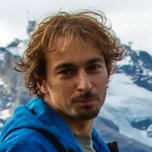
I learned many things in Matfyz, but nothing as important as the principles of reasoning. The methods of critical thinking and the ability to abstract and find solutions that could be applied in any context. The ability to reason and solve new problems is far more valuable than any specific knowledge.
The first years at Matfyz were definitely challenging for me. I went through many uncomfortable times trying to digest mathematical theories to pass the exams, but it also gave me many eye opening moments. In the later years, I was able to choose from practical as well as theoretical concerns, with more time to do “real” programming (either externally, working with the faculty, or on my own projects).
After finishing doctoral studies at Matfyz, I started at IBM research and then moved on to Google. Google is notorious for their challenging interviews, but with the reasoning skills I developed at MFF, it was an enjoyable and engaging round of conversations, like many I experienced during my studies.
Studying at Matfyz is not the right choice for everyone. If you just want to learn software development, Matfyz will not be the fastest or most direct path. But the extra effort will give you more insight into problems, and allow you to be more flexible and innovative in your thinking. If you appreciate complex problems, enjoy discussing principles with seemingly little practical impact, and enjoy taking things apart just to figure out how they work, then you might find that Matfyz is the perfect choice.
Martin Dienstbier (CFO & COO, DIANA Biotechnologies)
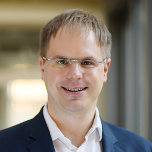
I was fortunate to be able to spend part of my career at the world most renowned academic institutions, be it my PhD at the University of Cambridge or my research fellowships at the University of Oxford. While Czech Republic may not have the institutions of the likes of Cambridge or Oxford, I think Matfyz is as close as it gets, whether it is in terms of the quality of both its academic staff and students, its specific study atmosphere or its reputation in the society or amongst employers. While you might get a joke or two about Matfyz nerds, you would generally enjoy a high level of respect for being a Matfyz graduate.
And it is clearly not only the scientific knowledge that you get at Matfyz, but also high level of general math and computational literacy and capability of critical and analytical thinking, which then open doors in future employments, even if outside your direct field of study.
I think my career can serve as a good example of such interdisciplinary enablement. After Masters in biophysics at Matfyz, I was able to get the PhD studentship in molecular biology at the University of Cambridge. Later, I benefited from my informatics foundations, which allowed me to start working on computational analysis of human genome. And even when I moved out of academia and joined the top management consulting firm, the Boston Consulting Group (BCG), my Matfyz background had been again appreciated, as I could utilize the ability of analytical thinking and structured approach to problems. Today (2019), I am a co-founder and CFO/COO of DIANA Biotechnologies, innovative biotech company which is advancing clinical diagnostics and drug discovery. I deal with company’s finances and business operations, yet I can still trace my career journey back to its beginnings at Matfyz.
Moreover, I met some great friends at Matfyz with whom I keep in touch long after my studies were completed.
Larysa Aharkava (Software Engineer, Google)

Studies at Matfyz are not always easy, but there is a lot of high level material. Courses not only provide students with theoretical knowledge, but also give a broad overview of practical aspects of programming work, as well as current innovations in the area of IT. Thanks to the knowledge I gained at Matfyz, it wasn’t a problem for me to start working as a programmer, even without previous experience. After graduation I received job offers from big companies such as Microsoft and Google.
Many of the teachers at Matfyz have a deep knowledge of their field of expertise and are open to discussion as well as being responsive to the demands of students. Staff at the Study Department always strive to help students the best they can and they are very pleasant and friendly. The faculty building is situated in an excellent location and modernly furnished. Studies in later years were quite flexible and this is why I was able to work as a computer programmer during my studies.
Moreover, at this faculty one meets a lot of clever and purposeful people and therefore Matfyz is an ideal place for “networking”. Matfyz students work all over the world (a lot of them work, for instance, at Google) where they try to disseminate not only their experience, but also opportunities for their fellow graduates.
Michal Beneš (Quantitative Analyst)
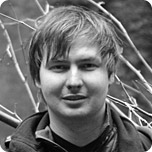
When I studied at Matfyz I especially enjoyed the interaction with my fellow students. There were many remarkable personalities among them, having many interests and broad horizons. There weren’t any nerds. The teachers are also unforgettable. Most of them were very accommodating towards students. Even the most distinguished experts were willing to devote a substantial amount of time to discussions with students interested in their field.
The credit system gives students a lot of freedom in choosing courses according to their interests and I dare say that the choice is very wide. I liked participating in seminars focused on solving mathematical problems. They turned out to be excellent training for my current job.
Jan Vondrák (Professor, Stanford University)
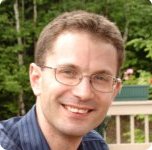
I spent eight happy years at Matfyz, starting in physics in 1992 and later transferring to computer science and discrete mathematics. Only later did I realize how fortunate I was to have had easy access to this kind of education. I have been studying and working in the United States since 2000: I received my PhD in applied mathematics from the Massachusetts Institute of Technology and then I worked at Microsoft Research, Princeton University and IBM Research. Looking back, I would say that undergraduate training at Matfyz is comparable with top-level institutions in the US. The quality of courses, academic standards and general vibe in Prague are in no way inferior to universities such as MIT or Princeton. In terms of advanced research, discrete mathematics and theoretical computer science at MFF UK is world-class, and the professors are widely acclaimed. I wonder if students in Prague realize how lucky they are to have such an institution within walking distance.
Jakub Vrána (Software Engineer, Google)
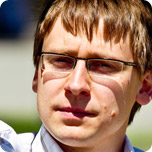
I could have done elementary school work with my hands tied behind my back, but at high school I really struggled and not many people believed I would get anywhere in my studies. However, the entrance exams for Matfyz seemed easy to me, because they dealt with exactly the same types of problems I enjoyed which don’t require studying because just thinking about them is enough. That’s when I began to suspect that this is a faculty where I would enjoy being.
During my studies I was already programming actively and I gained a high level of knowledge through experience. The theoretical basis offered at the university was, however, invaluable, because it would have taken me many years to understand the context of my work just from practice, if at all. Two courses which gave me the most in this respect were Data Structures and Complexity of Algorithms. Thanks to them I can understand what in programming makes sense to fiddle with and what can’t be improved upon.
The Master’s certificate was always just a piece of paper for me and I’ve never flaunted it. Well, not until the moment of arranging for a work visa to the US, when it proved a very useful thing to have. Even without it, I would definitely not regret having graduated from Matfyz.
Vera Koubková, MBA, MSc. (Consultant, Lecturer, Charity Founder)
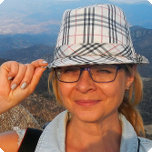
I came to study Mathematics at Matfyz with the desire to understand how the world works. It was, I admit, rather ambitious but it kept me motivated as the studies were not always easy and, as one of our professors used to say, one has to create one's own mathematics to really understand it. I graduated in 1997 in Computational Mathematics and after that, I worked as a consultant in Financial Services. First as a Programmer and a System Designer and later as a Programme Manager. I spent almost 15 years in Financial Services, I worked all over Europe and I also spent some time in Russia.
The 2008 financial crisis made me interested in complex systems and sustainability, which eventually led me to undertake a Master's degree in the subject. I left Financial Services and now I have what you may call a portfolio career. I started two companies: one providing consulting services and one providing training. We are helping companies with their technical architecture and increasingly also with a strategic redesign of their policies and processes so that they operate sustainably and help keep the world in a good shape for future generations. On the training front, we focus on management and leadership skills, and lately also on sustainability as a strategic function. We cooperate with business schools in the United Kingdom, some of which offer degrees online so I often work or supervise students from other countries and continents.
Besides the commercial work, I also run a small charity. We work with a community in a slum in Kenya, where we help build and equip schools, libraries and computer rooms. We also started a football club for orphans and to educate children through sport. I really appreciate the opportunity to understand some of the challenges faced by ordinary people in developing countries.
I am glad I studied Mathematics as my first degree, although I could not imagine where it would take me later in life. Mathematics taught me precision in thinking and a logical approach to problem solving. I learnt to identify patterns and place ideas, data and behaviour in context before drawing conclusions, which enables me to quantify risks, structure convincing arguments and explain ideas in simple terms. I also very much appreciate the personal approach of the professors at Matfyz. Research and teaching goes hand in hand at Matfyz so even the first year students are taught by the ‘big names’ in the field and the professors truly viewed us as colleagues rather than students.
I have travelled extensively through work as well as in my personal life. Having visited all the continents I now reside in London. I am glad I spent my teens and early twenties in Prague. Prague is big enough to be a metropolis yet small enough for people to know each other and know what’s going on. Prague is a cool place to be when you are young.
Pavel Podbrdský (Risk Officer, FlexiFin)
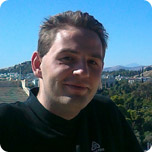
I decided to go into business consulting after I graduated, but I never regretted choosing Matfyz for doing my master’s studies. Although in my current job I do not use much of my theoretical knowledge of mathematics, the school did help me develop many important skills. The most important are analytical thinking, abstraction skills, approaches to the solution of complex problem, identification of the core of a problem and the ability to recognize and disregard its irrelevant aspects.
There is an inherent scientific integrity to mathematics: a mathematical theorem is either true or false regardless of whether we like it or not. I am convinced that our clients appreciate that we bring them an objective evaluation of their problems and suggested solutions, responsibly weigh up the pros and cons, and supply relevant arguments for their decisions, and do not just paint a rosy picture.
Matfyz gave me an opportunity to take various optional seminars and participate in student competitions. It helped me to develop the ability to formulate thoughts articulately and to capture the substance of the problem so that the other side understands the message. There is a creative environment of clever young people who stimulate each other so as to achieve better performance.
Daniel Kráľ (Professor, Masaryk University)
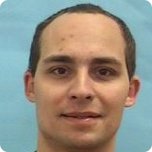
Matfyz is a brand that students at all Czech universities know well. The school is considered very hard to graduate from. Its students certainly enjoy a level of respect, but some would think of them as kind of strange since you can meet some unconventional fellows there. The reputation that Matfyz has comes from the fact that its students are required to know “why” in addition to “how”. Mandatory courses in the bachelor computer science program include, besides programming, algorithm design and data structures, topics in mathematics and the theoretical foundations of computer science. Though one might argue that some areas of computer science are much stronger at other Czech universities, Matfyz can prepare one for any career related to computers, be it in industry or academia. I have chosen the latter course and have appreciated the foundations I acquired at Matfyz.
During the years I spent as a student at Matfyz I gained a lot of knowledge and many skills, which I utilized later, as well as many nice memories. After graduation and working as a post-doc at TU Berlin and at Georgia Institute of Technology in Atlanta, I spent six more years at Matfyz, teaching and researching. It has been a joy for me to guide new students on their path to learn how computers work, in a similar way to how I myself was guided as a student. I hope that new students are still able to experience the same great atmosphere I did as a student. Many people extremely passionate for their work simply make Matfyz a nice place to study.
Jaroslav Gergič (Senior Director of Software Engineering, SentinelOne)
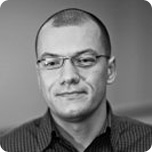
I consider the greatest value of Matfyz to be the fact that the teaching rests on strong mathematical foundations. Thanks to this, the knowledge and skills acquired during study there do not age as rapidly as the skills obtained at “practically” oriented schools. This is particularly important in the field of IT, which is evolving at such a breakneck speed that superficial knowledge of specific systems and implementations becomes obsolete in a matter of months.
A student at Matfyz has the opportunity to learn the skills of abstraction, generalization and mathematical reasoning, which are, in my opinion, key abilities necessary for the successful design and application of complex systems.
In connection with the above, I consider that, paradoxically, the greatest weakness of Matfyz is precisely the pedagogical approach to building those mathematical foundations: when I was struggling with analysis, algebra and other compulsory subjects in the first years of studies, I would have never dreamt that almost 15 years later I would regularly attend the Department of Algebra due to the necessity of laying a mathematical foundation for our software system and also that I would really enjoy algebra and have my eyes opened anew.
As for me, the fact that I was working part-time from the second semester helped me a lot during my studies. The solution of practical problems provided a counterpoint to theoretical studies at Matfyz, and allowed me to recognize the usefulness of certain theoretical topics, to which I gave the proper attention. I won’t hide the fact that it was challenging, and sometimes exhausting, but I still think that this combination of work and studies was ultimately beneficial.
Stanislav Kozina (Principal Engineering Manager, Microsoft Entra)
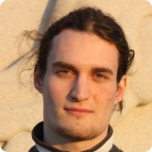
In our country there are several interesting schools where you can study computer science. Many have beautiful new buildings, modern laboratories and new equipment in the classrooms. The latest programming languages and tools, the latest products of the world’s firms are taught there. Matfyz, fortunately, doesn’t belong among them; it doesn’t look, from the outside, so “beautiful” as the other schools. It teaches instead how things work from the inside, knowledge that will not change over the next few years.
The modern technologies of today’s IT world include dynamic programming languages, Internet applications, source control systems and distributed applications. Most of the tools are not even ten years old and they are already being replaced by new products. But what is better about these new tools? Long ago there were interesting dynamic languages (Smalltalk 1980); TCP/IP (1974) is still used for the net; and there was even an entire distributed operating system (Plan 9 in the 1980s).
To deal only with the latest trends does not make sense because they are constantly changing. Matfyz teaches instead how things work, starting with mathematics, extending through the theory of programming languages, and up to possibilities of operating systems and hardware – and teaches it pretty well. There are not many schools that can accurately select those things you can count on not to be out of date in three years. It is demanding; it’s sometimes difficult, but it is worth it.
Each time I meet a new guy at interviews I realize how much I learned during my studies, and how important all that knowledge is. At school everything looked like a boring (and difficult) theory, but once I came face to face with a real big software project understanding all these principles was most essential. On the other hand, the technologies used (such as programming languages, databases etc.) are completely out of focus. These days I can finally appreciate how much Matfyz gave to all its students.
Jan Kára (Software Developer, SUSE Linux)
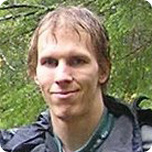
I started at Matfyz in 1998 and spent nine pleasant years doing master’s and later doctoral studies. During this time I appreciated the accommodating approach of my teachers, who always treated me as a partner, and the good relations students had with one another. I also had a lot of fun organizing events such as summer schools, mathematical olympiads, and seminars for high school students.
Also interesting were visits to departments abroad and participation in international conferences, which Matfyz enabled me to attend already during my master’s studies and to a generous extent during my doctoral studies.
After graduation I decided to work at SUSE Linux as a developer of the Linux kernel. Although I studied a theoretical specialization (corresponding to today’s field of Discrete Models and Algorithms), my studies at Matfyz have provided me with much even for my present job. The most valuable thing that I learned is the ability for exact logical thinking and the analysis of problems.
Another big benefit for me is the expanded outlook obtained during my stays abroad. Finally, I mustn’t forget to mention the excellent knowledge acquired in algorithms and mathematics, which often saves me time when solving problems.
So, if I had to summarize, Matfyz really gave me a lot for my present life.
Evelina Gabašová (Principal Research Data Scientist, The Alan Turing Institute)
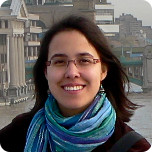
What I appreciate most in retrospect from studying computer science at Matfyz is the solid foundation it gave me not only in computer science and programming, but also in mathematics. These foundations helped me get a place without any problems on the annual master’s program in Machine Learning at University College London, one of Britain’s top universities. Only eight students out of seventy applicants for this subject were accepted, most being rejected due to insufficient knowledge of mathematics. This branch of artificial intelligence is at the interface between statistics and computer science. On the other hand, students with only a mathematical education had problems with the implementation of efficient algorithms. Matfyz gave me a good grounding in both fields.
When I compare studying at Matfyz to studying in the UK, I especially appreciate the relaxed and informal atmosphere that reigns at Matfyz. Personally, I think Matfyz is the best place to study computer science in the Czech Republic. The good foundations obtained at Matfyz helped me during interviews for doctoral studies in bioinformatics at the University of Cambridge. The supervisor of my computer science doctorate has a high opinion of computer science at Matfyz.
I’m glad computer science at Matfyz is not reduced to teaching programming. Matfyz provided me with a sufficient understanding in many areas of computer science, and thus helped me find the discipline that I wanted to pursue.
Jakub Černý (Consultant, Persoo Founder)
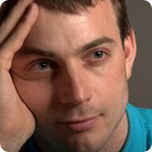
What will it bring, if one graduates from Matfyz? Why start? Only by looking back can I assess what I learned thanks to Matfyz.
At Matfyz one learns a lot of things without realizing it. A person will become a mathematician. Study and research provide one with enough practice so that logical and analytical thinking – making conclusions based on facts, not on unsubstantiated “lemmas” – gets under one’s skin. The ability to study more complex algorithms, which a person needs but still doesn’t know anything about, is also important.
Another important benefit of these studies is the ability to clearly present your ideas. Only now do I realize the huge benefit of the Combinatorics and Research seminars and also of the Spring Schools of Combinatorics, which are organized by the Department of Applied Mathematics (KAM). And, another thing which leaves its impression is the lovely, supportive atmosphere of KAM, which fosters one’s creativity.
If you want to know what is important for your future career, see the requirements for applicants at Google. You may be surprised how broad a knowledge of algorithms and data structures they require, and also how much emphasis they put on communication skills, teamwork, and the ability to present your ideas.
Jakub Jermář (Software Engineer, Kernkonzept)
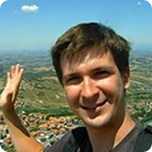
Matfyz gave me knowledge and experience, and taught me analytical thinking and a systematic approach to problems, thanks to which I can solve even the most difficult tasks. Matfyz took quite a lot in nerves and time, because the studies there were challenging, and some of the subjects are difficult to handle by a start-finish method, especially if one is not a strictly studious type and has other interests.
Coming from Prague, I thought that from the perspective of my own studies it was preferable to live in a dormitory because, as is well known, more heads are better than one, and the constant presence of other students creates a favorable learning environment.
I chose Matfyz because I wanted to penetrate the mysteries of software systems, and can declare my choice to be an excellent one. Specifically, I’d like to sing the praises of the Software Project class, where students work for a long time in a small team and by its joint forces create interesting technical projects, sometimes of epic proportions.
Michal Šrajer (Chief Happiness Officer, Happiness at Work)
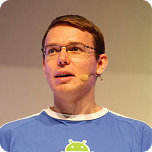
New technologies come and go, and I have benefited greatly in my present work from what I learned at Matfyz, even though I currently use completely different tools and deal with seemingly very different tasks.
I am very glad that I chose Matfyz for my university studies. It certainly wasn’t always a walk in the park, but when I look back at my studies from this short distance, I’m really glad that I honestly got through everything — including subjects which at the time seemed to be far away from computer science (such as mathematical analysis, of high repute). Those subjects gave me a much-needed and very stable foundation in logical reasoning and abstract thought for the solution of complex problems.
During my studies I often did other work, either in commercial companies or on my own projects. To succeed in the role of a software engineer/analyst was relatively easy thanks to the insight and knowledge I acquired. Now I work more in the role of a manager in the fast-growing company Inmite, which I also co-founded. Even here, in deciding, planning, or adapting to new or unexpected situations, I very often utilize what I learned at Matfyz.
Standa Živný (Professor, University of Oxford)
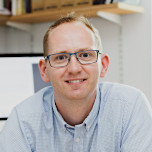
Matfyz is a fantastic brand in the Czech Republic, attracting some of the best secondary school students. As many graduates have successful careers both in academia and industry, the brand is also well recognised abroad.
During my teenage years, I had always known that Matfyz is the right place for me and I wasn't disappointed. I have only fond memories of my studies at Matfyz: challenging but enjoyable courses, excellent lecturers, smart fellow students, flexibility, and a friendly atmosphere (with a lot of volleyball options). I gained a lot of technical skills and learnt how to think. This helped me secure a PhD place at Oxford in 2006, a faculty job at Oxford in 2013, and was useful throughout my academic career. The education Matfyz offers is in my opinion comparable with education offered by the best universities in the world, including Oxford.
Martin Schmid (CEO & Co-Founder at Equilibre Technologies, Previously Senior Research Scientist at Google DeepMind)
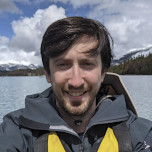
As the field is progressing at a faster and faster pace, the biggest value Matfyz taught me is the analytical way of thinking and how to understand things. I believe the one most critical skill is to be able to tell whether you truly understand something or not. Is fine not to understand something, but it is not fine to think you understand it when you don’t.
Matfyz is not only open to, but encourages international collaboration. As a visiting PhD student at the University of Alberta in Canada, I was fortunate enough to work closely with amazing people on groundbreaking research of DeepStack – the first AI to beat professional human players in no-limit Poker. This was a big achievement, as Poker has been a long standing AI challenge. DeepStack was published as a cover of the Science magazine and covered by major news all over the world. I joined Google DeepMind soon after that, where I spent amazing 5 years of my life, working on research related to AlphaZero.
After moving back from Canada to Prague, I decided to keep close to Matfyz and also to build EquiLibre Technologies. I started EquiLibre with the best people I worked with, with the vision of building a word-class research-driven organization in Prague. And while we attract great people from all over the world, Matfyz remains one of our important talent pools. As I also want to bring some of what I have learned over the years back to Matfyz, I now teach courses and lead some students here.
Michaela Weiserova (Master of Royal Mathematical School, Christ’s Hospital School)
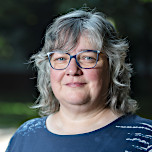
My whole life I was embracing logical thinking, but during my Matfyz studies I realised how we all have different limits and boundaries to progress in abstract thinking and mathematics. I will never forget my first working experience in Matfyz. I was sent to high-performance college in Prague and that was the moment, when I realised that I found my life mission and I decided to become Maths/Physics/IT teacher.
I taught in several schools in the Czech Republic, and I even tried to explore other business opportunities but eventually realised that I needed to go back to teaching and at the same time decided to move to the UK. I didn’t speak the language and my degree wasn’t valid there. So I had to start from the scratch. I eventually started teaching maths in various schools and in 2016 I become the Head of Maths in private boy’s school and guided the school through the COVID online teaching period.
In 2022 I moved to Christ’s Hospital School. My own version of “Harry Potter” school and one of the most traditional schools in England which was established in 16th century.
The Royal Mathematical School was founded in 1673 as a part of this school and went on to be shaped by some of the world’s foremost intellectuals, including Sir Isaac Newton and Sir Christopher Wren. In September 2023, I was appointed as the first female Master of Royal Mathematical School in 350 years of existence.
Thanks to Matfyz I had the drive and motivation to follow my dreams.
Marek Procházka (Software Engineer, European Space Agency)
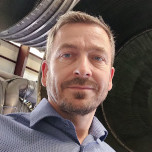
I studied Matfyz between 1991 and 2002. In 1997 I got my master’s degree and in 2002 my PhD. In addition to learning specific computer science topics which I used later in my career, when I think more about it, I believe that I benefited in three different ways.
First, at Matfyz I was exposed to some very complex math and theoretical computer science subjects, which required a lot of thinking, analytical skills and in many cases it was at the edge what I was able to understand. Not all of these complex topics were directly used in my career, but I believe that it was essential to acquire this skill of “mathematical thinking”.
Second, while studying these complex subjects, especially at the beginning of the studies but also later during my PhD studies, it was essential to meet some bright minds – students or teachers – who in my eyes were much smarter than me and I admired how quickly they were able to understand or solve complex problems. It was great to be one of the Matfyz guys, talk with my friends about all kinds of mathematical, logical, algorithmical or computer problems.
Last but not least, gradually I realized that even if sometimes I am balancing at the edge of what I can understand, trying to learn some sophisticated proofs and sometimes really failing to appreciate all the mathematical tricks, by any means I have to keep going if I want to keep working on some of the cool things I learned about at Matfyz. I have to keep studying, take my responsibility, do my assignments and take steps to achieve my objectives. A part of it was to aim high, do not let go and try to achieve something which even seems beyond what is achievable. Professor Plášil who was giving lessons on operating systems told me at one point that I might be interested in getting a PhD. At first I believed that he mistook me with another student, but then I quit my job as a programmer and started to work with him full time on my PhD. He believed in me and so I started to believe in myself too. So I guess what I learned was: if you like computer science, work hard, aim high and nothing is impossible. After I finished my PhD at MFF UK I got a postdoc position in the French National Institute for Research in Digital Science and Technology (INRIA), then another postdoc position at the Purdue University in the US and now in the European Space Agency I am in charge of the flight software and autonomy of the European habitable module of the Lunar Gateway space station, a part of the international Artemis programme lead by NASA to get humanity back to the Moon.
Tereza Jeřábková (Astronomer, ESO)
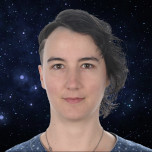
I embarked on my academic journey at MATFYZ, where I pursued a Bachelor's degree in General Physics, followed by a Master's in Astronomy and Astrophysics. MATFYZ stands out as a unique university, renowned for its high-quality lectures and personalized approach to education. This environment was instrumental in building a strong foundation in both physics and mathematics, essential for my career path.
The support I received from the Astronomical Institute of the Charles University during my studies was exceptional. I was encouraged to publish my research and had opportunities to travel, which expanded my horizons and fostered vital connections in the academic world. These experiences were crucial in paving the way for my future in academia.
I received my PhD at the University of Bonn in Germany, with research stays at European Southern Observatory and GTC telescope at La Palma in Spain. Upon completing my doctorate, I transitioned to the European Space Agency in the Netherlands, serving as a Research Fellow. Since 2022, I have been a staff astronomer at the European Southern Observatory, an esteemed institution that operates advanced telescopes in Chile. My journey from MATFYZ to the European Southern Observatory exemplifies a blend of rigorous academic training and real-world application, underscoring the value of a solid educational foundation and the pursuit of excellence in one's field.



